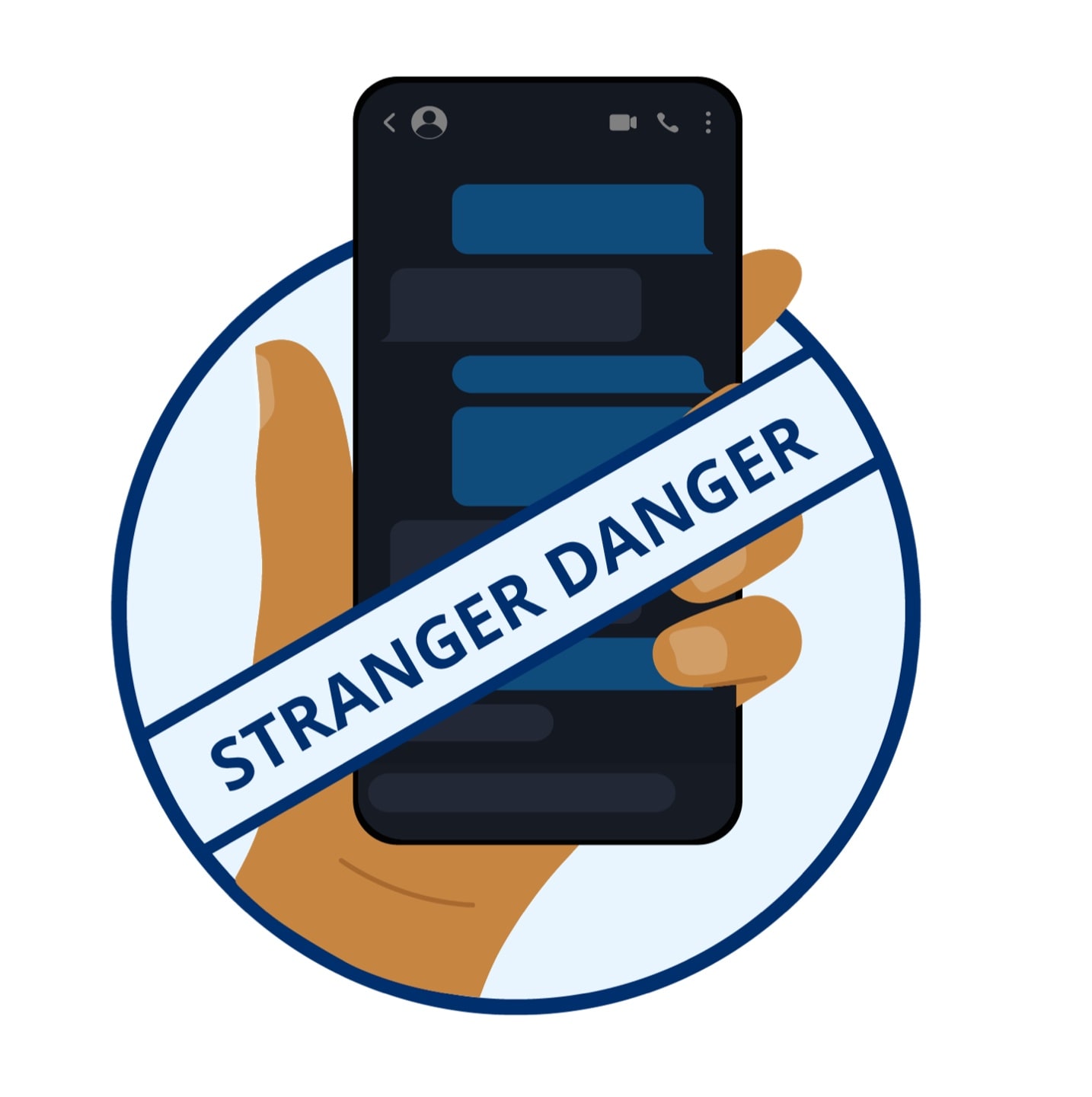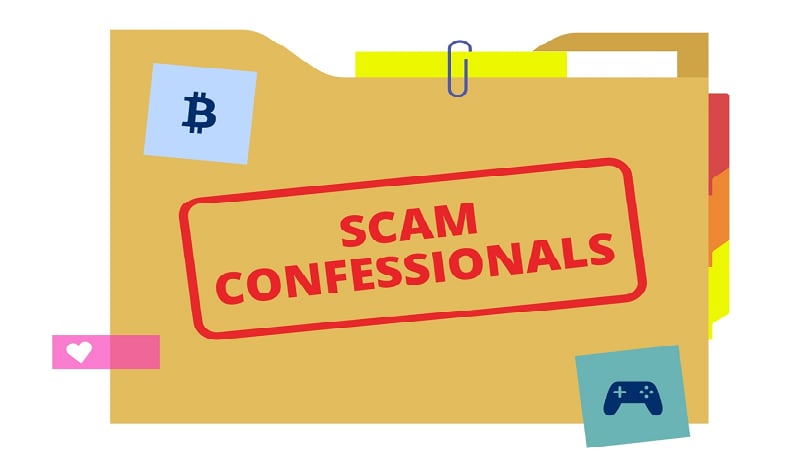SECURITY CENTER
Stranger danger’s back — and it’s sliding into your DMs.
Yes, you’ve heard it since you were five, but we’re not talking candy from a sketchy van anymore. Now, it’s professional scammers chatting you up, sharing gaming tips, hyping crypto, dropping hearts on your posts.
Before you know it, boom, they’re convincing you to buy something, send money or share personal info or pics.


A peek at the endless (and sadly, genius) ways scammers reel you in:
A fake company offers you money to promote their brand. They send you a check, tell you to deposit it and ask you to send part of the money back. The check bounces — you’re out hundreds of dollars.
You find an amazing deal for a sold-out show on social media, send money and never hear from the seller again. No tickets. No refund. No way to get your money back.
Scammers use fake or hacked profiles to flirt and send you private photos. You send some back. They threaten to send your photos to your family and friends unless you pay immediately.
You see a deal on new sneakers on a social media marketplace. The seller promises to ship as soon as they get your payment, but they don’t. No shoes and no way to recover your cash.
You see an apartment listing, and the landlord asks for a deposit before you even see the place. You send the money — then the listing and the “landlord” disappear. No apartment. No refund.
It was a hack to get free money, they said. Just write a check to yourself, deposit it at the ATM and withdraw cash before the bank realizes you deposited a bad check. I didn’t realize banks could consider this fraud, and now I owe them back the money.
They said I’d earn cash for posting referral links. The site looked real; my dashboard showed money adding up fast, and I didn’t think twice. But behind the link were shady sites stealing people’s info — and when I tried to cash out, I got nothing. The whole thing was a setup.
You get a text or email claiming to be from your bank, telling you your account is frozen. They ask you to click a link and enter your login details — except it’s a fake site, and now the scammer has full access to your account.
You click on a quiz to vote. Seems harmless, right? Except it asks for your name, birth date and even your pet’s name (aka, the answer to your security questions). Now, scammers have everything they need to steal your identity.
Scammers used AI to clone my brother’s voice from a short audio clip. They called my dad, pretending to be him, saying he was in serious trouble and needed bail money. It sounded exactly like him — even used his usual phrases. Meanwhile, I’d been texting the real him all day.
Another online player offers free skins, in-game currency or rare items if you visit a specific website. You enter your login details — and just like that, your gaming account is stolen. The scammer takes everything and may even sell your account online.
A scammer tricks you into believing they sent you money by accident and asks for it back. You send them a “refund” before realizing the original payment never happened.
You get an email about a scholarship or financial aid opportunity. To claim it, they ask for an “application fee” or personal information like your Social Security number. After you pay, you never hear from them again, and now your identity may be at risk.
Crypto scammers cash in on your FOMO
They use influencer hype, investment “experts” and pro-looking apps that show you making money — just to reel you in deeper. But try to cash out, and you’ll find it was all fake from the start.
Once they reel you in, what’s a scammer’s go-to move to get your cash?
A) “Just send it on a P2P payment app”
B) “Wire me real quick”
C) “I accept crypto”
D) All of the sketchy above
Answer D: Ding ding ding. Scammers love these payment methods because they'll receive the money fast and payments can't be canceled or reversed once they're sent. P2P payments, wires, crypto, and gift cards should be thought of like cash. Once the scammer gets the money, it's unlikely you'll be able to get it back from them.

They’re Tricky. You’re Smarter. Be Ready.
Don’t Trust Links
Random DM? Sketchy email? “Click this to claim?” Nope. Don’t tap, don’t enter info, don’t get scammed.
No Money for Strangers
If someone you just met online asks for cash, crypto or gift cards, it’s very likely a scam.
Using Payment Apps Is Like Sending Cash
Once you send money using P2P payment apps, wires and gift cards, you can't cancel or reverse the payment so you most likely will not get it back if you sent it to a scammer.
Stop Oversharing
Fake quizzes and “fun” challenges ask for your pet’s name or first car (aka, your security answers). Keep your info to yourself.
Too Good to Be True? It Is.
“Free money,” dream job offers, unreal discounts — if it sounds crazy good, it’s probably crazy fake.
Reverse Image Search
Cute new online crush? Plug their pics into Google. If they show up under 10 other names, you probably just dodged a scammer.
Help Keep Your Accounts Secure
Use strong passwords, consider using a password manager, turn on two-factor authentication and don’t share logins — even with your BFF.
Gut Feeling = Red Flag
If something feels even a little off, it probably is. Scammers are pushy for a reason. Trust your instincts, and don’t engage.
Talk About It
Scammers hate it when people compare notes. If you see a sketchy scam, warn your friends and report it. Be sure to check the reviews of online sellers.

Use Chase tools to help protect your money, including:
Account Alerts:
Get notified when money moves — so you stay in the know.
Card Lock/Unlock:
Lost or misplaced your card? It’s easy to stop purchases temporarily.
Chase Credit Journey®:
Get free identity monitoring and alerts that help protect your personal data (must be over age 18).
One final rule:
Scammers are very good at making you feel that if you don’t act right now, you’ll miss out, or something bad will happen. That panic you feel? That’s the scam working. Your safest option is to Block, Delete and Move on.
Targeted by a scammer? Remember, they rely on fear, panic and silence.
Stay Calm & Tell Someone
Whether it’s a parent, teacher or older sibling, don’t keep it to yourself.
Ghost Them
The second something feels off, cut contact. Block, delete and move on.
Don’t Send Money
No matter what they say — sob story, fake prize, “accidental” payments — once you send money, it’s probably gone.
Don’t Try to Outsmart Them
Scammers are pros. Trying to “mess with them” or “get revenge” can make things worse.
Report It
Report the scam to the social media platform, your bank (if money was involved) and the U.S. Federal Trade Commission at reportfraud.ftc.gov.
Warn Your Friends
Scammers cast a wide net. If they tried you, they’re probably reaching out to others too.
OK parents, you taught them stranger danger
But how can you prepare them for online strangers?
Encourage skepticism
Teach your teen or young adult to question everything. If a deal, job or online relationship feels too good, it probably is.
Check privacy settings together
Sit down and lock down their social media. Make sure accounts are private, location sharing is off, and personal details aren’t visible.
Push for strong security
Help them set up two-factor authentication on their accounts and consider a password manager.
Teach smart money moves
Make sure they know that once they send money, they might not get it back.
We’re here to help
You’ll find a wealth of information about scams and fraud here at your Chase Security Center, so continue exploring and learning. Working together, we can help keep the scammers at bay.